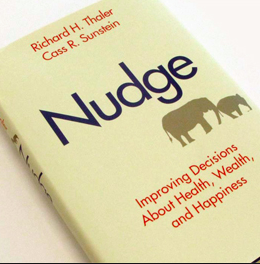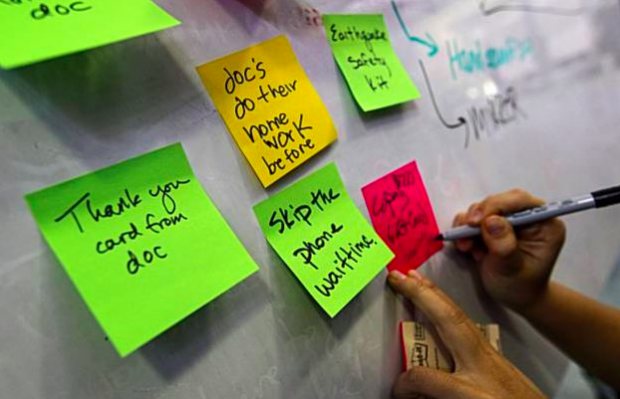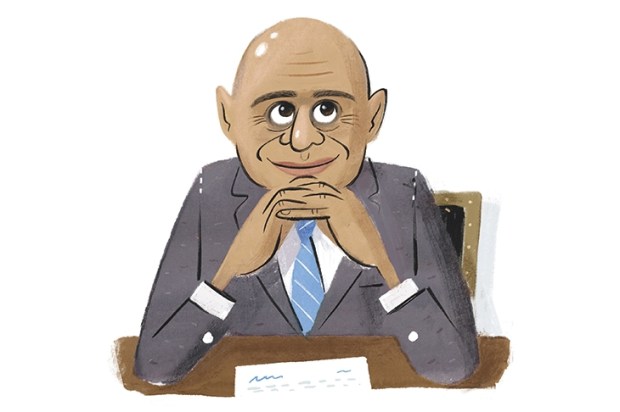‘Let me give you a Californian hug,’ says Steve Hilton, and I try my best to give him a Scottish one. We have met a few times before. He served as David Cameron’s chief strategist and his job was to keep out of the headlines and newspapers. In government, he took on a near-mythical status as a restless, shoeless radical who roamed around Downing Street terrifying civil servants. Then, after two years in power, he jetted off to California, where he has kept quiet. Until now.
We meet to discuss his new book, More Human, which is his manifesto for radical conservatism. It is, he says, an outline of where David Cameron’s government will go next. ‘That’s the direction we’ve already been going down. Now, with the removal of the constraint of coalition and the improvement in the economy, it just makes it easier to do more of that.’ The book is, perhaps, the closest we’re going to get to an agenda for David Cameron’s second term.
Living in Palo Alto has confirmed Hilton’s view that the UK places too much power in too few hands. As he puts it, ‘In America, economic, cultural and political power is dispersed. In the UK, centralisation is a gift to the vested interests.’ This is the theme not only of his book but of the Prime Minister’s new agenda to grant devolution to English regions.
‘I developed this very closely with Oliver [Letwin] and we had a mantra for it: you should devolve power to the individual where possible, and to the lowest level of government where that’s not possible. Only higher where necessary. It’s a very, very bottom-up approach and that informed our thinking in all sorts of areas.’ Hilton’s ideas may change their name, but they never go away. His plan for devolution is now known as George Osborne’s plan for a ‘Northern Powerhouse’: a deal where councils are given extra powers if they agree to impose an elected mayor. Hilton loves the idea.
‘Mayors are accountable in the way a council is not,’ he says. ‘Who can name their local councillor? A single accountable figure is much more democratic in a way because people can relate to them. When you are talking about reducing Whitehall’s central bureaucracy, it’s important to think of what can be carried out in a way that is more democratic because it’s closer to people.’ Britain has 632 MPs, I say — so how many mayors would he like?
‘Many more: 10,000 mayors.’ Or perhaps more. ‘Pretty much everywhere there’s a community that can be defined.’
There is one small snag: four years ago, Cameron asked voters in 10 different cities if they wanted mayors; nine said no. Surely, I ask, imposing them anyway means government becoming less human, not more human? ‘It’s a semantic argument: are you somehow not a localist if you impose localism? If you believe in localism and in decentralisation, there is no other way. How else do you get from A to B?’
His book is dedicated to Rohan Silva, a former Treasury civil servant who quit to join George Osborne in opposition, followed him into government and then left to try to test the entrepreneur-friendly policies he had advocated. The result is Second Home, a luxury office block in East London where Hilton has based himself for these last few days. It looks a massive Virgin first class airport lounge plonked in Brick Lane. There are no right angles in the building because (as we learn from Hilton’s book) ‘if you are in an artificial rectangular space, your brain is restricted’. When Hilton went to California, leaving Silva in the cubicles of Whitehall, they kept working together.

They spotted some time ago that conservative principles of opportunity, creativity and creative destruction were now driving tech entrepreneurship. And even making a comeback in paperback with the work of Nicholas Nassim Taleb (‘The Black Swan’) and Richard Thaler (‘Nudge’). It was anomalous: conservative principles were flying off the bookshelves and were at the cutting edge of the new digital economy. But the Conservatives was seen as the party of the establishment, marinated in the thinking of yesteryear.
To Hilton and Silva, this was anomalous. They set about inviting Taleb, Thaler and other thinkers into No10 and sought to fuse their ideas with what was happening in government. Hilton’s book gives examples.
‘Within weeks of becoming prime minister,

Cameron gave the go-ahead to set up a ‘nudge’ unit of our own,’ he writes. The idea was to tweak words used by government in hope of a better response. For example, a succinct JobCentre text message sending news of new jobs received a 10 per cent response rate. But personalising that message (“I’ve booked you a place. Good luck, Michael”) led to a 27 per cent response rate.
Another example comes from an entrepreneurs’ academy at Stanford University where Hilton has been lecturing for the last few years. It’s called the d.school, after the so-called ‘design thinking’ that he advocates. It’s a place where ideas are scrawled on Post-It notes to demonstrate the process of brainstorming.

In the book, Hilton explains how he and Silva brought this process to the British government. Some 200 senior civil servants were summoned for a seminar in ‘design thinking’. By the time it was over, Post-It notes were stuck all over No. 10’s wood-panelled state dining-room. “It’s easy to mock”, Hilton writes, “or portray as the latest management fad. In fact it’s much more than that. It’s a fundamental re-orientation of policymaking, from a focus on bureaucratic needs and priorities to the real lives.”
In government, he tells me, the civil servants did go along with that. “Where we were able to change things we had a very, very receptive audience. Jeremy Heywood [the head of the civil service] would be the first to say that we worked very well together. In the end, they are public servants, they want to see good outcomes.” The civil service problem, he says, is “not the people, definitely not, it’s the system”.
His time in government also gave him plenty of examples of the failings of the system. He once accompanied the Prime Minister on a trip to Nigeria and saw a school sponsored by DfID, the foreign aid department. It was, he writes, a ‘disaster’. He then want to see a for-profit school in the Lagos slums which held ‘rows of eager pupils happily studying in the midst of utter chaos and squalor’. Parents living on less than a dollar a day, he says, chose the fee-charging school over the DfID-backed school, which was free. In his book, he denounces the ideology that stops DfID supporting for-profit schools — and denounces the ‘sanctimonious, ignorant, hypocritical hand-wringers who argue that the evil “profit motive” must not violate the noble innocence of education’.
Of course, these hand-wringers very much include the friends he left in government — whom he’s very careful not to criticise in his many interviews. He uses less caustic language when discussing the ban on profit-seeking schools in England. ‘The cost of starting a new school is much more easily borne by an organisation that can invest that money because they know they repay investors,’ he says. ‘It’s actually a way of getting more money into schools.’ And if Cameron were to allow profit-making free schools, parents would find ‘not just a couple of extra schools to choose from in your neighbourhood but 20, 30 schools that can cover the whole range of different approaches.’
Referring to Hilton as ‘David Cameron’s brain’ is unfair to both men, but contains an element of truth. The two have bounced ideas off each other for years, shaping their mutual understanding of politics. As Michael Gove once observed, ‘It is sometimes impossible to know where Steve ends and David begins.’ At the heart of Hilton’s politics is a belief that the new ideas coming out of California express an old conservative insight: that he who governs best governs least, and that the purpose of acquiring power is to give it away, from government to the people.
Had Hilton remained in government, we would doubtless be hearing a Cameron speech under the theme ‘more human’. The name changes: once, it was the ‘post-bureaucratic age’, then the much-mocked ‘Big Society’. Now, it’s the Northern Powerhouse and, perhaps, part of the emerging ‘One Nation’ conservative agenda. Renegotiating our membership of the EU is, to Hilton, very much part of it. I ask him about a study he is said to have commissioned, which looked at how much of government work is conducted at the behest of Brussels. Is it true that a third of what No. 10 did had nothing to do with the Prime Minister’s agenda?
‘No, it was the other way round,’ he says. ‘Only a third was our agenda. The rest wasn’t. You read about that theory, and it is pretty staggering when you get into government.’ For Hilton, the frustrations proved to be too great — and when his wife landed a senior job at Google, he made the jump. ‘What I love about California is this attitude of being supportive and positive about things. When you tell someone your idea, the answer is: “Great, how can I help?” not “Well that’s not going to work.”’
His book launch the next evening, in the same venue, demonstrates how Hilton’s influence remains. David Cameron, George Osborne and Jeremy Hunt were in attendance, along with financiers, journalists, PR supremos and the curious breed of tech hipsters. Hilton paid an emotional tribute to the Prime Minister, made a few jokes at his own expense and then announced that it was Oliver Letwin’s birthday (he was, of course, present). ‘So let’s give him a big “ruling elite” rendition of Happy Birthday!’ he said. A fiddler struck up, and the people who run the country duly sang along.
Got something to add? Join the discussion and comment below.
Get 10 issues for just $10
Subscribe to The Spectator Australia today for the next 10 magazine issues, plus full online access, for just $10.
You might disagree with half of it, but you’ll enjoy reading all of it. Try your first month for free, then just $2 a week for the remainder of your first year.














Comments
Don't miss out
Join the conversation with other Spectator Australia readers. Subscribe to leave a comment.
SUBSCRIBEAlready a subscriber? Log in